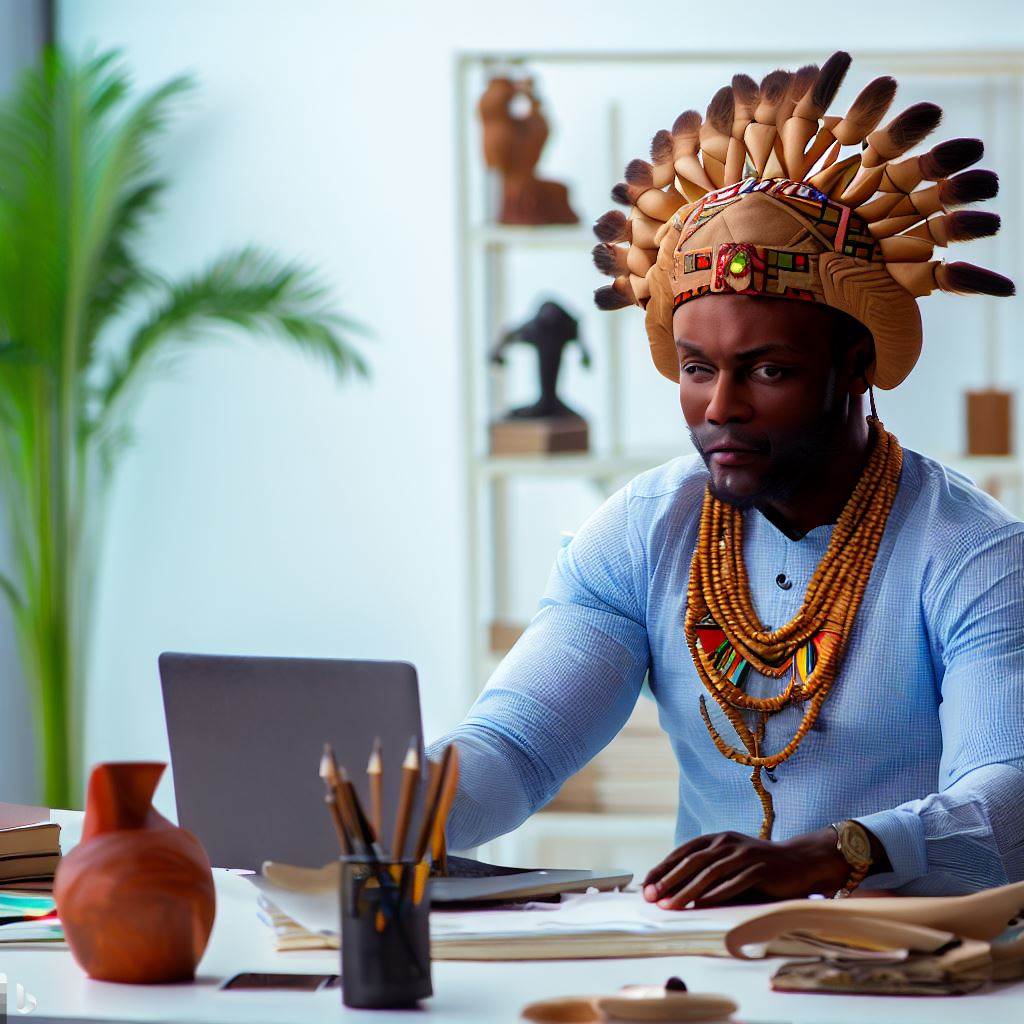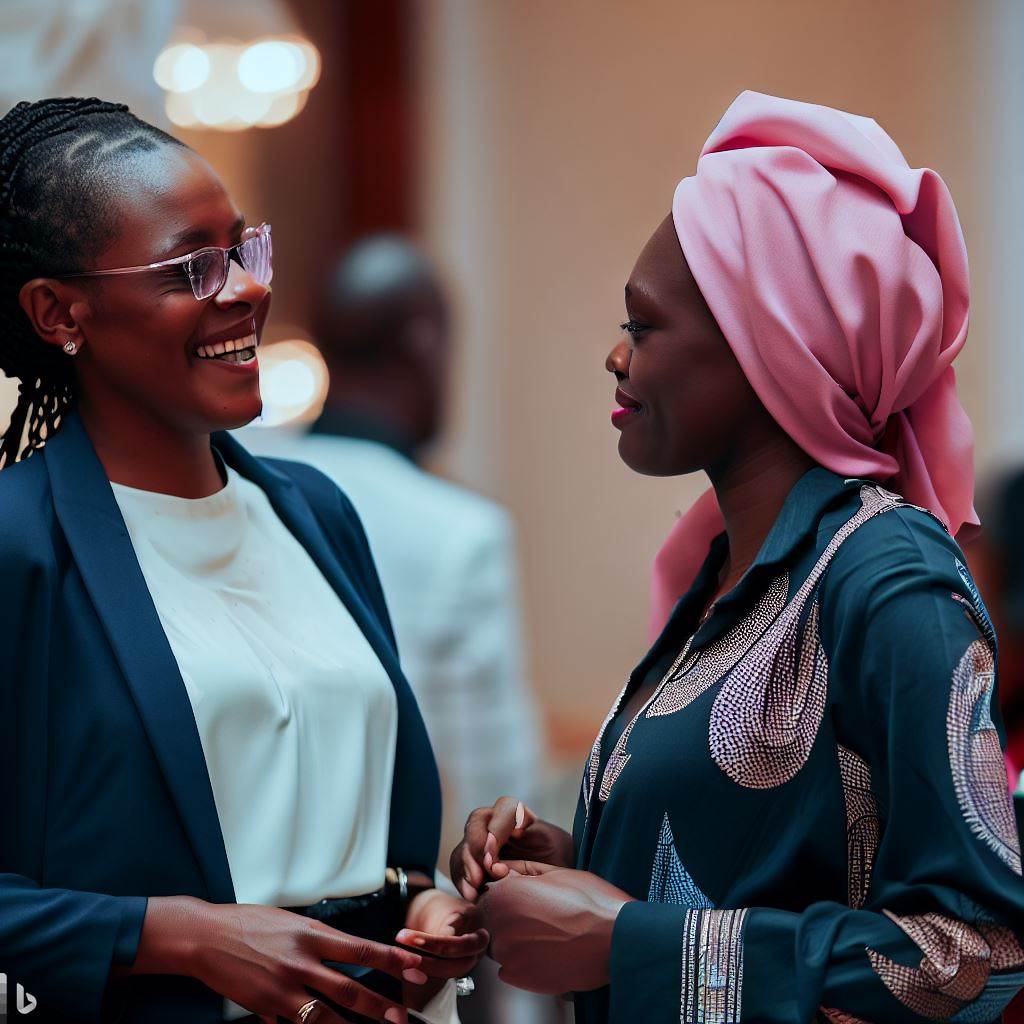Introduction
Interior decorators play a crucial role in enhancing the aesthetics and functionality of spaces in Nigeria. Their expertise is sought after in various settings, including residential, commercial, and hospitality.
The work of interior decorators involves selecting and combining colors, furniture, fixtures, and other design elements to create visually appealing and harmonious environments.
Legal considerations hold significant importance for interior decorators in Nigeria.
Adhering to legal requirements ensures that their work meets safety, environmental, and regulatory standards.
This includes obtaining necessary permits, licenses, and certifications to operate legally in the industry.
Additionally, complying with copyright and intellectual property laws protects decorators from plagiarism and ensures ethical practice.
Interior decorators also need to consider legal aspects related to contracts and agreements.
Clear and well-drafted contracts protect both the decorator and their clients, outlining the scope of work, payment terms, deadlines, and any additional terms and conditions.
Addressing legal considerations in contracts minimizes disputes and provides a framework for resolving any issues that may arise during the project.
Furthermore, understanding legal obligations related to health and safety is vital for interior decorators.
They must prioritize the well-being of clients by using materials that meet safety standards and maintaining a healthy indoor environment.
Compliance with fire and building codes is imperative to prevent accidents and adhere to lawful practices.
Basically, legal considerations are essential for interior decorators in Nigeria to ensure ethical practice, protect their work, and provide a safe environment for their clients.
Fostering a legal mindset enables decorators to navigate the industry successfully and build trust with their clientele.
Licensing and Registration
Interior decorators in Nigeria are required to obtain licenses and register their businesses as per legal requirements.
This process entails acquiring a license and paying associated fees. Let’s explore the details.
1. Legal Requirement for Obtaining Licenses and Registering
- Interior decorators in Nigeria must comply with legal obligations and obtain licenses.
- Registering their businesses is a mandatory step for practicing interior decoration legally.
2. Acquiring a License and Associated Fees
- Interior decorators need to follow a specific process to acquire the necessary license.
- The process involves submitting an application to the appropriate regulatory body.
- Applicants may be required to provide documentation such as educational certificates and work experience.
- They may also need to pass an examination or assessment to demonstrate their skills and knowledge.
- Upon successful completion of the requirements, a license is issued to the interior decorator.
- The associated fees for acquiring a license may vary depending on the regulatory body and region.
3. Benefits of Being a Licensed Interior Decorator
- Credibility and Trust: Being licensed assures clients of the decorator’s professional credibility and trustworthiness.
- Legal Protection: Licensed decorators are legally protected and have recourse in case of disputes or legal issues.
- Enhanced Marketability: Having a license sets decorators apart from unlicensed competitors, attracting more clients.
- Access to Resources: Licensed professionals often gain access to industry resources and opportunities.
- Industry Recognition: Licensing demonstrates a decorator’s commitment to professional standards and ethics.
- Better Networking: Being part of a licensed community allows decorators to network with fellow professionals.
It is crucial for interior decorators in Nigeria to understand and comply with the legal requirements for licensing and registration.
By doing so, they can establish their credibility, gain legal protection, and unlock numerous opportunities in the industry.
Read: Salary Expectations for Interior Decorators in Nigeria
Business Structure and Taxation
Different business structures that interior decorators in Nigeria can choose from
When starting a business as an interior decorator in Nigeria, it is important to consider the different business structures available.
Each structure has its own tax obligations and responsibilities that decorators must comply with. Here are the different business structures commonly chosen by interior decorators:
- Sole Proprietorship: This is the simplest and most common form of business structure. As a sole proprietor, the decorator is personally liable for all business debts and obligations. They report their business income on their personal tax returns.
- Partnership: Two or more decorators can form a partnership where they share the profits, liabilities, and management responsibilities. This structure requires a partnership agreement to outline the division of profits and responsibilities.
- Limited Liability Company (LLC): Forming an LLC provides decorators with limited liability protection. Personal assets are separate from business liabilities. An LLC has to register with the Corporate Affairs Commission in Nigeria.
- Cooperative Societies: Decorators can also choose to form a cooperative society, which is an association of individuals with similar business interests. Profits and liabilities are shared among the members according to their contributions.
Tax obligations and responsibilities for each business structure
Now, let’s dive into the tax obligations and responsibilities for each business structure:
- Sole Proprietorship: As a sole proprietor, decorators are required to register for a Personal Income Tax (PIT) and obtain a Taxpayer Identification Number (TIN). They are responsible for filing their personal tax returns annually.
- Partnership: Partnerships have similar tax obligations to sole proprietorships. Each partner must register for a PIT and obtain a TIN. The partnership itself is not taxed. Instead, the business profits flow through to the individual partners who report them on their personal tax returns.
- Limited Liability Company (LLC): LLCs are subject to the Companies Income Tax Act (CITA). They are required to file annual tax returns and obtain a TIN for the company. The company’s profits are taxed separately from the individual owners.
- Cooperative Societies: Cooperative societies are also subject to the CITA. They must obtain a TIN and file annual tax returns. The members, as individuals, must also fulfill their personal tax obligations.
Tips for interior decorators to effectively manage their taxes and comply with the Nigerian tax laws
Now that you understand the tax obligations, here are some tips to effectively manage your taxes and comply with Nigerian tax laws:
- Maintain accurate and up-to-date financial records to properly track your income and expenses.
- Consult a professional tax advisor to ensure you understand and meet all tax obligations.
- Keep records of all tax filings and payments to avoid penalties for non-compliance.
- Stay updated on changes to Nigerian tax laws and regulations that may affect your business.
- Consider employing the services of a professional accountant to handle your tax matters.
- Utilize available tax incentives and deductions to minimize your tax liabilities legally.
- Keep separate business and personal bank accounts to maintain proper financial records.
- Submit your tax returns and payments on time to avoid penalties and interest charges.
By understanding the different business structures and tax obligations, interior decorators in Nigeria can manage their taxes effectively and comply with the laws.
Remember to consult with professionals to ensure you stay on top of your tax responsibilities.
Read: Nigeria’s Interior Design Market: Opportunities and Challenges
Contracts and Agreements
Written contracts and agreements play a vital role in the interior decorating industry in Nigeria.
Key elements that should be included in contracts
When it comes to contracts with clients, suppliers, and subcontractors, certain key elements should always be included:
- Identification of the parties involved
- Scope of work and project timeline
- Payment terms and schedule
- Intellectual property rights
- Insurance and liability provisions
- Dispute resolution mechanisms
- Termination and cancellation clauses
Having written contracts helps protect the rights and interests of both parties involved in an interior decorating project.
It ensures that all parties have a clear understanding of their obligations, responsibilities, and expectations.
For clients, a written contract provides a certain level of assurance that the decorator will deliver the agreed-upon services within the specified timeframe and budget.
It also serves as a legal document in case of any disputes or breaches by either party.
Suppliers and subcontractors also benefit from having written agreements. These agreements outline the terms of their involvement, including pricing, delivery schedules, and quality standards.
Without a proper agreement, suppliers and subcontractors may face non-payment or be held accountable for delays or subpar work.
Potential legal issues that can arise without proper contracts and agreements
Without proper contracts and agreements, there are several potential legal issues that can arise:
- Disputes over scope of work and project expectations
- Payment conflicts and delays
- Intellectual property infringement
- Failure to obtain necessary permits and licenses
- Liability for property damage or injuries
- Breach of confidentiality and non-disclosure
- Inability to resolve disputes and conflicts
Contracts and agreements help protect interior decorators from potential legal risks and liabilities.
By clearly stating the scope of work, payment terms, and liability provisions, decorators can mitigate the chances of misunderstandings or disputes with clients, suppliers, or subcontractors.
Furthermore, including clauses for intellectual property rights is crucial in this industry.
It ensures that the decorator retains ownership of their design concepts and prevents unauthorized use or replication by others.
In the absence of written contracts and agreements, interior decorators may face significant challenges. Disputes and disagreements can lead to costly legal battles and damage professional relationships.
Without clearly outlined responsibilities and timelines, projects may suffer from delays, budget overruns, and unsatisfactory results.
The importance of contracts and agreements cannot be emphasized enough in the interior decorating industry in Nigeria.
They provide protection, clarity, and a solid foundation for successful projects, fostering trust and professionalism in the business.
Read: How to Get Certified as an Interior Decorator in Nigeria

Intellectual Property and Copyright
Importance of respecting intellectual property rights in the interior decorating industry
Respecting intellectual property rights is crucial in the interior decorating industry.
It not only protects the originality and creativity of designers but also promotes a fair and ethical business environment.
Interior decorators can take several measures to safeguard their creations and designs.
These steps ensure that their work is recognized and appreciated while maintaining its exclusivity.
Ways in which interior decorators can protect their own creations and designs
Here are some ways in which interior decorators can protect their own creations and designs:
- Copyright Registration: Registering the original designs and creations with the Nigerian Copyright Commission provides legal protection against unauthorized reproduction or use.
- Use of Watermarks: Applying watermarks to images and digital content acts as a deterrent against unauthorized use and establishes ownership.
- Non-Disclosure Agreements: When collaborating with clients or contractors, utilizing non-disclosure agreements prevents the unauthorized sharing or replication of design concepts.
- Trademark Protection: If an interior decorator has established a unique brand or logo, registering trademarks ensures exclusive rights and prevents others from using similar signs.
- Documenting the Creative Process: It is important to maintain records, sketches, and drafts as evidence of the creative process, which can be useful in case of any disputes regarding originality.
- Licensing Agreements: Granting licenses to manufacturers or retailers allows an interior decorator to control the use and reproduction of their designs while earning royalties.
How to properly use copyrighted materials and avoid infringement
Furthermore, it is essential for interior decorators to properly use copyrighted materials and avoid infringement. Here are some guidelines to follow:
- Obtain Proper Permissions: Seek permission from the copyright owner before using their work in any form, be it images, music, or written content.
- Cite the Source: Always credit the original source when using someone else’s copyrighted material.
- Fair Use: Familiarize yourself with the concept of fair use, which allows limited use of copyrighted material for purposes such as criticism, comment, or education.
- Public Domain Material: Utilize materials that are in the public domain, meaning they are not protected by copyright.
- Creative Commons License: When using creative works with a Creative Commons license, ensure compliance with the specified terms and give appropriate attribution.
By respecting intellectual property rights, interior decorators contribute to a thriving and innovative industry.
Protecting one’s creations and designs not only safeguards individual interests but also fosters creativity and diversity within the profession.
Read: Top Interior Decorator Schools in Nigeria: Where to Study?
Health and Safety Regulations
Interior decorators in Nigeria must prioritize safety to avoid legal complications. Here are crucial steps to follow:
- Workspace Safety: Keep your workspace hazard-free. Eliminate tripping and fire risks by maintaining a clutter-free area.
- Proper Ventilation: Ensure adequate ventilation to prevent health issues from fumes and dust. Use exhaust fans or open windows.
- Safety Gear: Provide your team with safety gear like helmets, gloves, and masks when dealing with potentially harmful materials.
- Electrical Safety: Hire a licensed electrician to handle wiring. Regularly inspect and maintain electrical systems.
- Emergency Exits: Have clearly marked emergency exits in your workspace and educate your team on their use.
- First Aid Kits: Maintain well-stocked first aid kits and ensure your team knows how to use them.
- Chemical Handling: Store and handle chemicals according to manufacturer guidelines. Label them clearly.
- Permits: Before starting any project, obtain necessary permits from local authorities. Failure to do so can lead to legal trouble.
- Insurance: Invest in comprehensive liability insurance to cover any accidents or damage during projects.
- Safety Training: Train your team in safety protocols and provide regular updates on new regulations.
- Documentation: Keep detailed records of safety measures and employee training. This can serve as evidence of compliance if needed.
- Inspections: Schedule regular safety inspections to identify and address potential risks.
- Accident Reporting: Establish a clear procedure for reporting accidents and incidents. Follow up with corrective actions.
- Environmental Regulations: Comply with environmental laws, especially when handling hazardous materials.
- Worker Welfare: Ensure your workers have access to clean water, sanitation facilities, and rest areas.
By adhering to these safety measures and staying informed about health and safety regulations, interior decorators in Nigeria can create a secure work environment, reduce accidents, and avoid legal complications.
Always prioritize the well-being of your team and clients while beautifying interior spaces.
Consumer Protection and Dispute Resolution
Consumer Protection Laws for Interior Decorators in Nigeria
- Interior decorators in Nigeria are subject to consumer protection laws that aim to safeguard the interests of clients.
- These laws ensure that decorators provide services of acceptable quality and adhere to professional standards.
- The Consumer Protection Council (CPC) Act of 1992 is a prominent legislation protecting consumer rights.
- Under the CPC Act, interior decorators are required to provide accurate information about their services and pricing.
The Importance of Clear Communication, Transparency, and Ethical Practices
- Clear communication with clients is crucial to avoid misunderstandings or unrealistic expectations.
- Interior decorators must provide transparent information about costs, timelines, and any limitations associated with the project.
- Ethical practices, such as respecting client confidentiality and avoiding conflicts of interest, build trust and credibility.
- By maintaining open and honest communication, decorators can foster positive relationships with clients and reduce the chances of disputes.
Guidance on Resolving Disputes and Handling Complaints
- In the event of a dispute, interior decorators should strive to reach an amicable resolution with their client.
- First, they should engage in open dialogue to understand the client’s concerns and find common ground.
- If no agreement is reached, professional mediation or arbitration can be considered as a less formal and more cost-effective means of dispute resolution.
- Mediation involves a neutral third party helping the parties negotiate a resolution, while arbitration results in a binding decision by an arbitrator.
- Interior decorators should also have a clear complaint-handling procedure in place to address any grievances raised by clients.
- Responding promptly and professionally to complaints demonstrates a commitment to client satisfaction and helps prevent legal escalation.
- If a complaint cannot be settled internally, clients always have the option to seek legal remedies through appropriate legal channels.
Consumer protection and effective dispute resolution are essential components for interior decorators operating in Nigeria.
By complying with consumer protection laws, communicating clearly, and maintaining ethical practices, decorators can minimize conflicts and build successful client relationships.
Conclusion
Interior decorators in Nigeria should be aware of several legal considerations.
These include obtaining the necessary licenses and permits, understanding tax obligations, and complying with copyright and intellectual property laws.
It is crucial for decorators to prioritize compliance with the law and seek legal advice when needed.
This ensures that their business operations are conducted ethically and within the legal framework.
Operating within the legal framework as an interior decorator in Nigeria offers numerous benefits.
It provides a competitive advantage, enhances credibility and trustworthiness among clients, and protects the decorator’s creations and designs.
By staying informed about and adhering to legal requirements, decorators can establish a reputable and successful business in the Nigerian interior design industry.




